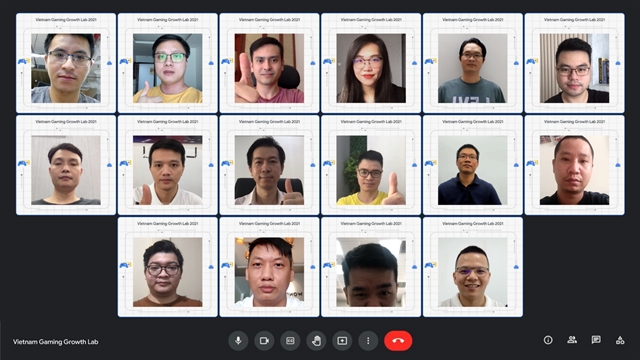 Economy
Economy


|
| Representatives of game studios in Việt Nam attend the online graduation ceremony of the 2021 Vietnam Google Gaming Growth Lab on Wednesday. — Photo courtesy of Google |
HCM CITY — Thirty two Vietnamese game studios have graduated from a nine-week intensive training course provided by Google Gaming Growth Lab, the first of its kind in Southeast Asia.
They were mentored by Google advisors and international and local industry experts for developing products for the global market.
The 32, selected from more than 80 candidates, were trained in the industry’s best practices for building a complete game business model, developing high-quality products, acquiring players, generating adequate revenues, and international expansion.
They were offered direct in-depth consultancy and support by leading gaming experts and Google’s cross-functional expert team.
Lan Nguyen, the founder of IndieZ Game Studio, said, "This is an extremely high-quality programme timed perfectly when mobile game companies are growing strongly in Việt Nam.
“The support from the Google team and the dedicated experts of the Gaming Growth Lab helped indie studios a lot. We have learned how to create a strategic framework in many areas of development such as team building and management, product research and development, optimising and promoting our mobile games to the world market."
Việt Nam’s gaming industry is on the rise.
According to the 2020 App Annie Global report, five of the top 10 gaming companies in Southeast Asia and the Asia-Pacific in terms of the highest number of downloads are from Việt Nam and one in every 25 games downloaded globally is made by a Vietnamese company.
Trâm Nguyễn, country manager for Laos, Cambodia, and Vietnam, Google Asia Pacific, said, “With over two billion active users in more than 190 countries, Google Play offers an international platform for local start-ups to go global.”
Nguyễn Quang Đồng, head of the Institute for Policy Studies and Media Development, said: “Gaming needs to be recognised and supported by policymakers to position it as a major player in the digital content industry. Thus policymakers should minimise regulatory barriers and roll out more incentive schemes to spearhead the industry’s growth.” — VNS




